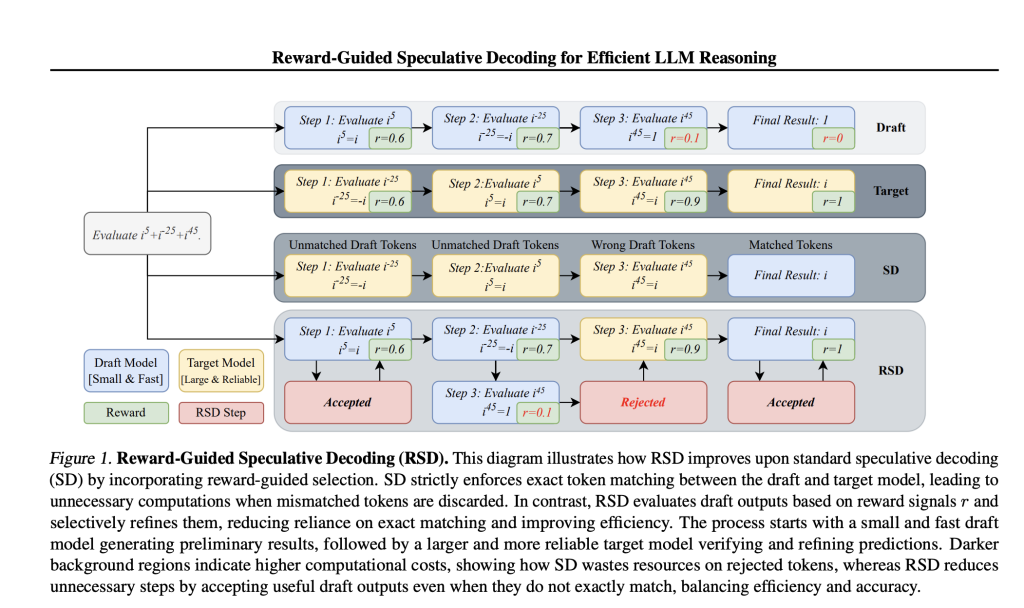

In recent years, the rapid scaling of large language models (LLMs) has led to extraordinary improvements in natural language understanding and reasoning capabilities. However, this progress comes with a significant caveat: the inference process—generating responses one token at a time—remains a computational bottleneck. As LLMs grow in size and complexity, the latency and energy demands for sequential token generation become substantial. These challenges are particularly acute in real-world deployments, where cost, speed, and scalability are critical. Traditional decoding approaches, such as greedy or beam search methods, often require repeated evaluations of large models, leading to high computational overhead. Moreover, even with parallel decoding techniques, maintaining both the efficiency and the quality of generated outputs can be elusive. This scenario has spurred a search for novel techniques that can reduce inference costs without sacrificing accuracy. Researchers have therefore been exploring hybrid approaches that combine lightweight models with more powerful counterparts, striving for an optimal balance between speed and performance—a balance that is essential for real-time applications, interactive systems, and large-scale deployment in cloud environments.
Salesforce AI Research Introduces Reward-Guided Speculative Decoding (RSD), a novel framework aimed at improving the efficiency of inference in large language models (LLMs). At its core, RSD leverages a dual-model strategy: a fast, lightweight “draft” model works in tandem with a more robust “target” model. The draft model generates preliminary candidate outputs rapidly, while a process reward model (PRM) evaluates the quality of these outputs in real time. Unlike traditional speculative decoding, which insists on strict unbiased token matching between the draft and target models, RSD introduces a controlled bias. This bias is carefully engineered to favor high-reward outputs—those deemed more likely to be correct or contextually relevant—thus significantly reducing unnecessary computations. The approach is grounded in a mathematically derived threshold strategy that determines when the target model should intervene. By dynamically mixing outputs from both models based on a reward function, RSD not only accelerates the inference process but also enhances the overall quality of the generated responses. Detailed in the attached paper , this breakthrough methodology represents a significant leap forward in addressing the inherent inefficiencies of sequential token generation in LLMs.

Technical Details and Benefits of RSD
Delving into the technical aspects, RSD operates by integrating two models in a sequential yet collaborative manner. Initially, the draft model produces candidate tokens or reasoning steps at a low computational cost. Each candidate is then evaluated using a reward function, which acts as a quality gate. If a candidate token’s reward exceeds a predetermined threshold, the output is accepted; if not, the system calls upon the more computationally intensive target model to generate a refined token. This process is guided by a weighting function—typically a binary step function—that adjusts the reliance on the draft versus the target model. The dynamic quality control afforded by the process reward model (PRM) ensures that only the most promising outputs bypass the target model, thereby saving on computation. One of the standout benefits of this approach is “biased acceleration,” where the controlled bias is not a detriment but rather a strategic choice to prioritize high-reward outcomes. This results in two key benefits: first, the overall inference process can be up to 4.4× faster compared to running the target model alone; second, it often yields a +3.5 average accuracy improvement over conventional parallel decoding baselines. In essence, RSD harmonizes efficiency with accuracy—allowing for a substantial reduction in the number of floating-point operations (FLOPs) while still delivering outputs that meet or even exceed the performance of the target model. The theoretical underpinnings and algorithmic details, such as the mixture distribution defined by PRSD and the adaptive acceptance criterion, provide a robust framework for practical deployment in diverse reasoning tasks.
Insights
The empirical validation of RSD is compelling. Experiments detailed in the paper demonstrate that, on challenging benchmarks such as GSM8K, MATH500, OlympiadBench, and GPQA, RSD consistently delivers superior performance. For instance, on the MATH500 benchmark—a dataset designed to test mathematical reasoning—RSD achieved an accuracy of 88.0 when configured with a 72B target model and a 7B PRM, compared to 85.6 for the target model running alone. Not only does this configuration reduce the computational load by nearly 4.4× fewer FLOPs, but it also enhances reasoning accuracy. The results underscore the potential of RSD to outperform traditional methods, such as speculative decoding (SD) and even advanced search-based techniques like beam search or Best-of-N strategies.

Conclusion: A New Paradigm for Efficient LLM Inference
In conclusion, Reward-Guided Speculative Decoding (RSD) marks a significant milestone in the quest for more efficient LLM inference. By intelligently combining a lightweight draft model with a powerful target model, and by introducing a reward-based acceptance criterion, RSD effectively addresses the dual challenges of computational cost and output quality. The innovative approach of biased acceleration allows the system to selectively bypass expensive computations for high-reward outputs, thereby streamlining the inference process. The dynamic quality control mechanism—anchored by a process reward model—ensures that computational resources are allocated judiciously, engaging the target model only when necessary. With empirical results showing up to 4.4× faster inference and an average accuracy improvement of +3.5 over traditional methods, RSD not only paves the way for more scalable LLM deployments but also sets a new standard in the design of hybrid decoding frameworks.
Check out the Paper and GitHub Page. All credit for this research goes to the researchers of this project. Also, feel free to follow us on Twitter and don’t forget to join our 75k+ ML SubReddit.
The post Salesforce AI Research Introduces Reward-Guided Speculative Decoding (RSD): A Novel Framework that Improves the Efficiency of Inference in Large Language Models (LLMs) Up To 4.4× Fewer FLOPs appeared first on MarkTechPost.
Source: Read MoreÂ



 Recommended Open-Source AI Platform: ‘IntellAgent is a An Open-Source Multi-Agent Framework to Evaluate Complex Conversational AI System’ (Promoted)
Recommended Open-Source AI Platform: ‘IntellAgent is a An Open-Source Multi-Agent Framework to Evaluate Complex Conversational AI System’ (Promoted)